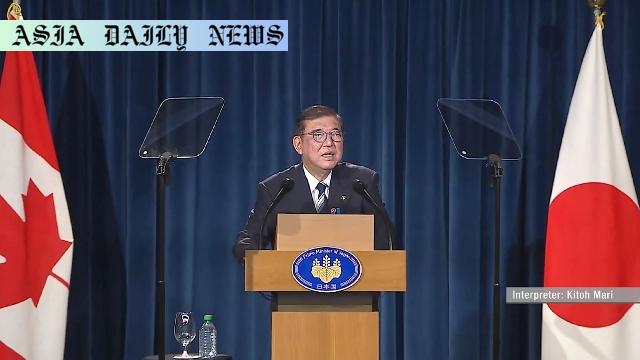G7 Summit: Japanese PM Ishiba Highlights Middle East Tensions and Tariff Talks with US
Japanese PM Ishiba emphasized the importance of G7 unity and its global stability efforts.
Middle East unrest and rising oil prices are under close observation by the Japanese government.
Tariff discussions with the US remain unresolved but are progressing.
Ishiba met with South Korea’s new president to discuss North Korea and regional cooperation.

Introduction: The Significance of the G7 Summit
The Group of 7 (G7) summit in Canada provided world leaders the opportunity to address critical geopolitical and economic challenges. For Japanese Prime Minister Ishiba Shigeru, these included the escalating tensions in the Middle East, rising oil costs, and ongoing international tariff disputes. This summit, described as a forum for uniting nations under shared ideals like democracy and freedom, showcased the potential of collaborative global governance to address pressing issues.
Middle East Unrest and Japan’s Concerns
One of the most pressing concerns highlighted by Prime Minister Ishiba during the G7 summit was the ongoing unrest in the Middle East and its potential global ramifications. Ishiba acknowledged the significant impact that sustained instability in the region could have, particularly on the global oil market. Japan, as a major importer of oil, is especially sensitive to price fluctuations caused by volatility in oil-producing regions. Ishiba assured citizens and international observers that his government would closely monitor price trends and take necessary actions to mitigate domestic disruptions caused by rising fuel and gas prices.
This proactive stance reflects Japan’s reliance on stable energy supplies and its broader responsibility as a G7 member to address global energy concerns. By emphasizing de-escalation in the Middle East, the joint statement issued during the summit also reinforces the urgency of minimizing such conflicts to avoid wider economic and humanitarian crises.
Tariff Talks with the United States: Ongoing Progress
Prime Minister Ishiba also discussed his efforts to engage in trade discussions with US President Donald Trump during the summit. While the negotiations over tariffs did not conclude in a concrete agreement, Ishiba expressed optimism about the progress being made. In his post-summit address, he shared his commitment to protecting Japan’s economic interests while seeking a mutually beneficial agreement with the United States.
The tariff issue underscores the ongoing complexity of balancing bilateral trade interests, particularly between two major economies like the United States and Japan. It also highlights the G7’s role as a platform for candid dialogue among world leaders aimed at resolving disagreements in a constructive manner.
Strengthening Ties with South Korea
Amid the focus on the Middle East and US trade relations, Prime Minister Ishiba also held significant one-on-one discussions with South Korea’s newly elected President, Lee Jae-myung. This marked their first official sit-down meeting, during which they agreed on the importance of collaboration, particularly in addressing North Korean issues. Japan and South Korea share a vital role in promoting stability and security in East Asia, making this meeting a key moment in fostering regional cohesion.
Through emphasizing cooperation, the meeting signals a positive step forward in Japan-South Korea relations, which have historically been tense but remain crucial for addressing shared challenges like nuclear proliferation and regional stability.
Looking Ahead: Japan at the NATO Summit
Prime Minister Ishiba’s engagement at the G7 summit sets the stage for his participation in the upcoming NATO summit in the Netherlands. As Japan continues to navigate its role in global security and economic stability, these international forums remain critical venues for advancing its diplomatic objectives and addressing global challenges collaboratively. Ishiba’s ability to navigate discussions at both summits will undoubtedly shape Japan’s influence on international policies in the months ahead.
Commentary
The Importance of Unity at the G7 Summit
The G7 summit highlights the crucial role international cooperation plays in addressing global challenges. Prime Minister Ishiba’s emphasis on shared values like democracy and freedom underscores the necessity of uniting across differences to achieve solutions beneficial to all parties. In an increasingly fragmented world, maintaining such forums as platforms for dialogue is essential to promoting stability and collective progress.
Middle East Unrest and Global Implications
The ongoing unrest in the Middle East is a stark reminder of the interconnectedness of modern economies. Rising oil prices do not just affect one region—they ripple across the globe, impacting everything from inflation to transportation costs. Ishiba’s proactive approach to mitigating this impact reflects strong leadership, not only for Japan but also as a global stakeholder. His call for de-escalation underscores the critical need for diplomatic solutions to prevent further disruptions.
Complexities of Trade Discussions
Tariff negotiations between Japan and the United States demonstrate the inherent challenges in aligning the economic policies of two major global powers. While progress remains slow, Ishiba’s commitment to achieving a mutually beneficial arrangement could set a precedent for how allied nations can resolve disputes constructively. Economic tensions between such powers highlight the vulnerability of global trade systems while also providing opportunities to strengthen these frameworks through negotiation and compromise.
Regional Cooperation in East Asia
Prime Minister Ishiba’s meeting with South Korean President Lee Jae-myung is a significant step in addressing shared regional concerns, particularly regarding North Korea. Cooperation between neighboring countries is essential for maintaining peace and security in East Asia, and this meeting signals a positive shift towards collaboration. Strengthening ties with South Korea is not only beneficial for bilateral relations but also reinforces regional stability at a time of uncertainty.
Conclusion
The G7 summit covered a broad spectrum of critical issues, from Middle Eastern unrest to economic negotiations and regional cooperation. Prime Minister Ishiba’s engagement on these fronts showcases his commitment to addressing both Japan’s immediate concerns and the broader challenges facing the global community. Moving forward, Japan’s active participation in international forums like the NATO summit will further cement its role as a key player in addressing the pressing issues of our time.


